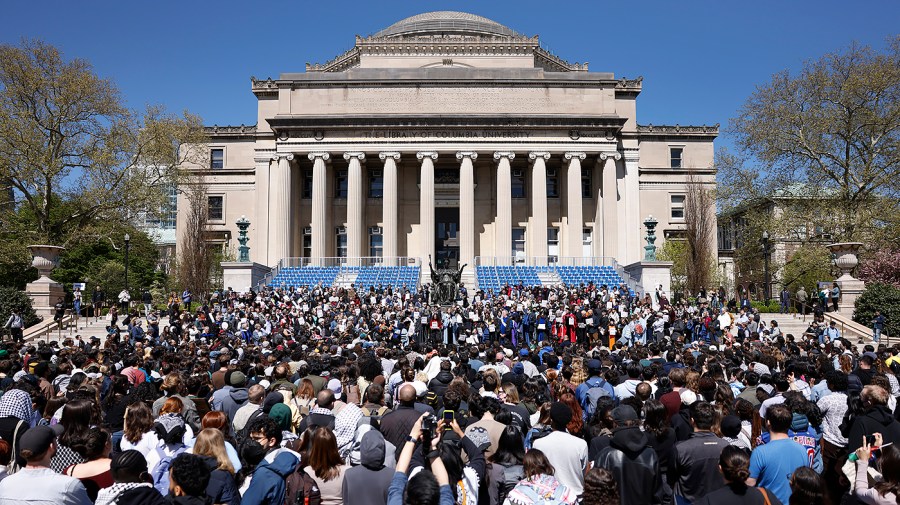
Dozens of Columbia University and Barnard College faculty stood in solidarity with students protesting the Israel-Hamas war on Monday, as a number of politicians criticized the demonstrations and inaction from university leadership.
Hundreds of students have occupied Columbia’s campus for days, protesting the Biden administration’s response to the Israel-Hamas war, backing a cease-fire in the conflict and urging Congress to stop sending military aid to Israel.
More than 100 protesters were arrested Friday on university leaders’ orders, but demonstrations have only expanded since, now branching out to other college campuses across the country.
Video from the demonstration Monday shows a large crowd of faculty, some dressed in full academic regalia, mingling and chanting with students as part of the protest, which has now drawn into its sixth day.
University president Minouche Shafik is facing calls to resign from 10 House Republicans from New York. Sen. John Fetterman (D-Pa.) has also called for Shafik to either take action or step down.
In a press conference from Columbia on Monday, a group of Jewish Democrats also denounced the protests and Columbia’s administration, labeling the demonstration as antisemitic.
“We are all standing here today as Jewish members of Congress to make one thing clear, Jewish students are welcome here at Columbia. And while the leadership of Columbia may be failing you, we will not,” Rep. Josh Gottheimer (D-N.J.) said.
“And Columbia University, if they don’t follow through, will pay the price,” he added.
The criticism comes as concerns rise over the safety of the Jewish student body at Columbia, with some accusing protesters of harassment. Columbia moved classes online starting Monday, hours before the Jewish holiday of Passover begins.
The Biden administration denounced the protests Sunday, calling them “blatantly antisemitic” and encouraging “calls for violence.” New York City Mayor Eric Adams (D) made similar comments.
A significant portion of the protesting students are Jewish, and protest groups have fought back against characterizations of their demonstrations as antisemitic. There have been no reports of violence from the protests.
“We are frustrated by media distractions focusing on inflammatory individuals who do not represent us,” protest leaders wrote in a statement Sunday. “Our members have been misidentified by a politically motivated mob.”
“We firmly reject any form of hate or bigotry and stand vigilant against non-students attempting to disrupt the solidarity being forged among students,” they continued. “Palestinian, Muslim, Arab, Jewish, Black and pro-Palestinian classmates and colleagues who represent the full diversity of our country.”
In response to the criticisms of Columbia’s administration, Shafik said earlier Monday in a statement that she is “deeply saddened” by campus protests.
“The decibel of our disagreements has only increased in recent days,” she said. “These tensions have been exploited and amplified by individuals who are not affiliated with Columbia who have come to campus to pursue their own agendas. We need a reset.”
“There is a terrible conflict raging in the Middle East with devastating human consequences,” she continued. “But we cannot have one group dictate terms and attempt to disrupt important milestones like graduation to advance their point of view. Let’s sit down and talk and argue and find ways to compromise on solutions.”
University leaders will hold discussions with student protesters and faculty in the coming days as an attempt to “deescalate” tensions on campus, she said.
Copyright 2024 Nexstar Media Inc. All rights reserved. This material may not be published, broadcast, rewritten, or redistributed.














